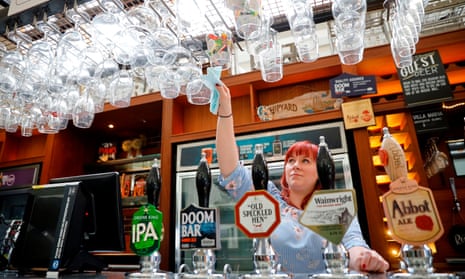Back to our main story, long lorries. The government said legislation will go before parliament today to “safely roll out” the vehicles on roads from 31 May.
These new lorries will move the same volume of goods, but will use 8% fewer journeys than current trailers, the Department for Transport said. This will generate an expected £1.4bn in economic benefits and take one standard-size trailer off the road for every 12 trips.
Lorries with longer trailers will also save 70,000 tonnes of carbon dioxide from being released into the atmosphere, ministers estimate.
The move follows an 11-year trial to ensure the longer lorries are used safely on roads, and operators will be encouraged to put extra safety checks and training in place. The trial demonstrated that they were involved in around 61% fewer personal injury collisions than conventional lorries, the DfT said.
However, road safety campaigners are dismayed by the move.
Roads minister Richard Holden said:
Everyone around the country depends on our haulage sector for their everyday needs – from loo rolls to sausage rolls – and a strong, resilient supply chain is key to the government’s priority to grow the economy.
These new longer lorries will make a big difference for British businesses like Greggs, who will see 15% more baked goods delivered, from tasty pastries to the nation’s much-loved sausage rolls.
It’s fantastic to see this change for our supply chain come into law, resulting in a near £1.4bn boost to the haulage industry and driving economic growth. Let the good times roll as we reduce congestion, lower emissions and enhance the safety of British roads.
Filters BETA
The government said more than 300 companies in the UK took part in the long lorry trial and almost 3,000 vehicles are already on the road.
Businesses that will be rolling out the use of longer semi-trailers (as long lorries are officially known) include Greggs, Morrisons, Stobart, Royal Mail and Argos.
Gavin Kirk, supply chain director at Greggs, said:
We welcome the introduction of LSTs into general use. Since 2013, Greggs has been operating LSTs from our National Distribution Centre in Newcastle. We were early adopters of the trial as we saw significant efficiency benefits from the additional 15% capacity that they afforded us.
We have converted 20% of our trailer fleet to LSTs, which was the maximum allowable under the trial, and these complement our fleet of double-deck trailers. Our drivers undertook additional training to use these trailers and we have monitored accidents, finding that they are as safe as our standard fleet.
Due to the increased capacity, we have reduced our annual kilometer travel by 540,000 km, and saved 410 tonnes of carbon per year from LSTs. This supports our wider ESG agenda, the Greggs Pledge.
The Department for Transport said vehicles which use LSTs will be subject to the same 44 tonne weight limit as those using standard trailers. They are also expected to cause less wear on the roads than conventional lorries due to the type of steering axle used.
However, road safety campaigners are not convinced that longer lorries are safe(r).
The Campaign for Better Transport tweeted:
The blogger Miles King tweeted:
Back to our main story, long lorries. The government said legislation will go before parliament today to “safely roll out” the vehicles on roads from 31 May.
These new lorries will move the same volume of goods, but will use 8% fewer journeys than current trailers, the Department for Transport said. This will generate an expected £1.4bn in economic benefits and take one standard-size trailer off the road for every 12 trips.
Lorries with longer trailers will also save 70,000 tonnes of carbon dioxide from being released into the atmosphere, ministers estimate.
The move follows an 11-year trial to ensure the longer lorries are used safely on roads, and operators will be encouraged to put extra safety checks and training in place. The trial demonstrated that they were involved in around 61% fewer personal injury collisions than conventional lorries, the DfT said.
However, road safety campaigners are dismayed by the move.
Roads minister Richard Holden said:
Everyone around the country depends on our haulage sector for their everyday needs – from loo rolls to sausage rolls – and a strong, resilient supply chain is key to the government’s priority to grow the economy.
These new longer lorries will make a big difference for British businesses like Greggs, who will see 15% more baked goods delivered, from tasty pastries to the nation’s much-loved sausage rolls.
It’s fantastic to see this change for our supply chain come into law, resulting in a near £1.4bn boost to the haulage industry and driving economic growth. Let the good times roll as we reduce congestion, lower emissions and enhance the safety of British roads.
European stock markets have opened cautiously higher but are little changed, with the FTSE 100 index in London up nearly 6 points at 7,770.
National Express will change its name to Mobico Group from early June.
Its board believes that the name better reflects the company’s international nature and its diverse range of services.
However, its operating subsidies will retain their current names and National Express will still be used for the UK’s national coach network and certain other businesses.
Other businesses that have renamed itself include the insurance and pensions group Standard Life Aberdeen as abrdn, which provoked ridicule.
The pub chain J D Wetherspoon has reported seeing its highest-ever Easter week sales and busiest-ever Saturday in recent weeks, as cash-conscious customers search out cheaper options amid the cost of living crisis.
The group said it is expecting to reach record sales in the current financial year, following recent strong trading.
Wetherspoon’s which runs just over 830 across the UK and Ireland, said it had benefitted from a surge in sales in the past two weeks, which have both included bank holiday weekends.
It described the first weekend, which included the bank holiday on 1 May, as being “exceptionally strong” for trading, where it reported its “busiest-ever Saturday”.
However, Wetherspoon’s said the coronation weekend was slightly less busy in its pubs, and reported last Saturday as being “noticeably quiet”. The company suggested that many customers had probably bought alcohol at supermarkets to consume while watching the ceremony at home, rather than in hospitality venues such as pubs and restaurants.

The travel group Tui is expecting a “strong summer” as bookings have picked up and it has raised its prices. The most popular destinations include Spain, Greece and Turkey.
The company, which owns hotels, planes and cruise ships, said winter travel had met its expectations, while summer bookings are 13% higher than last year and have almost caught up with pre-pandemic levels (at 96% of summer 2019).
Average prices are “significantly higher”. They have increased by 5% since last year but on a like-for-like basis, prices are 8% higher, excluding rebookings from previous seasons. Compared to the summer of 2019, average prices are 26% higher.
In the UK, nearly two-thirds of holidays have been sold for the summer. Bookings are similar to the previous summer but are 10% above pre-pandemic levels.
Tui has repaid the German state aid it received after the Covid outbreak. It made revenues of €3.2bn in the second quarter, up from €2.1bn a year earlier. Its quarterly loss shrank by €88m to €242m in underlying earnings.

The online fashion retailer Asos has swung to a first-half loss amid a drop in sales, but said it was confident it would return to a profit in the second half.
Sales fell 7% year-on-year in the six months to 28 February as the shift to online shopping partially reversed, although Asos said it remained “notably higher” than before the Covid pandemic. UK sales were down 10% while Europe was flat, the US posted a 7% drop and the rest of the world was down 12%.
Asos also scaled back its ranges to “right-size stock,” after a massive £100m stock writeoff last October. The company, which announced a major restructuring then, made an adjusted pretax profit loss of £87.4m against a profit of £14.8m a year earlier.
The UK government is to approve the use of longer lorries despite warnings that this will increase the number of fatal road accidents.
The Department for Transport announced that lorries up to 18.55m long, which is 2.05m longer than standard size, will be permitted from the end of the month under legislation going before parliament today.
Ministers argue that longer lorries will increase efficiency and cut emissions.
Longer lorries can carry more in fewer trips but have a larger tail swing and extended blind spots, and road safety groups have warned of the dangers for pedestrians and cyclists and potential damage to roadside infrastructure.
Longer lorries have been trialled since 2011 and around 3,000 are already on the roads. From 31 May any business in England, Scotland and Wales will be allowed to use them.
In Germany, inflation eased to an annual rate of 7.2% last month from 7.4% in March, according to Destatis, the statistics office.
Ruth Brand, the Destatis president, said inflation had weakened for a second successive month but remained at an elevated level.
Food continued to be the main driver, up 17.2% year-on-year while energy prices climbed 6.8%. Dairy products, bread, fish, sugar, jam and honey posted the biggest increases.
The main event in financial markets today is the US inflation numbers for April.
Michael Hewson, chief market analyst at CMC Markets UK, says:
With the Federal Reserve having raised rates again last week by 25bps today’s April CPI numbers are the next key benchmark feeding into whether the next meeting will see the Federal Reserve hit the pause button and keep rates unchanged after several meetings of consecutive hikes.
While headline CPI fell to 5% in March from 6% in February, the picture for core prices did little to offer encouragement that inflation would continue to fall sharply, and it is in this area which the Fed is keen for markets to focus their attention on.
On the core measure in March, prices rose on an annual basis to 5.6% from 5.5%, putting core inflation above headline inflation for the first time since January 2021.
It is this stickiness in core prices as well as the resilience in the US jobs market that is making the Fed’s job so difficult, even allowing for the fact we’ve seen the US central bank hike rates at every meeting over the last 12 months.
Also today, the boss of John Lewis will face a confidence vote by staff members as the partnership considers the option of bringing in outside investment in a change that could threaten the decades-old employee-owned model.
Chairman Sharon White is considering radical ways to bring in up to £2bn to help secure the future of the group, including diversifying into building flats for rent above shops, after reporting hefty losses from its chain of department stores and Waitrose supermarkets.
The Agenda
9am BST: Italy Industrial production for March
1.30pm BST: US Inflation for April (forecast: 5%, previous: 5%)
https://news.google.com/rss/articles/CBMinAFodHRwczovL3d3dy50aGVndWFyZGlhbi5jb20vYnVzaW5lc3MvbGl2ZS8yMDIzL21heS8xMC9hc29zLXN3aW5ncy1maXJzdC1oYWxmLWxvc3MtbG9uZ2VyLWxvcnJpZXMtYWxsb3dlLXVrcy1yb2Fkcy1yZWR1Y2Utam91cm5leXMtdXMtaW5mbGF0aW9uLWJ1c2luZXNzLWxpdmXSAZwBaHR0cHM6Ly9hbXAudGhlZ3VhcmRpYW4uY29tL2J1c2luZXNzL2xpdmUvMjAyMy9tYXkvMTAvYXNvcy1zd2luZ3MtZmlyc3QtaGFsZi1sb3NzLWxvbmdlci1sb3JyaWVzLWFsbG93ZS11a3Mtcm9hZHMtcmVkdWNlLWpvdXJuZXlzLXVzLWluZmxhdGlvbi1idXNpbmVzcy1saXZl?oc=5
2023-05-10 07:54:34Z
1999098338
Tidak ada komentar:
Posting Komentar